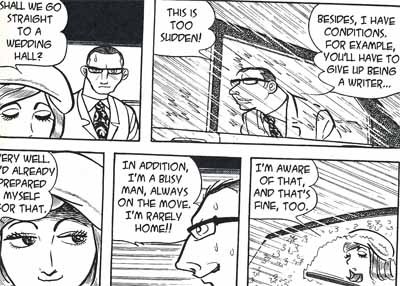 Osamu “Astro Boy, et cetera, et cetera” Tezuka’s 1970 manga is rather weary and cynical. It stars a professional player who thrives because the world full of marks who just can’t wait to get played.
Osamu “Astro Boy, et cetera, et cetera” Tezuka’s 1970 manga is rather weary and cynical. It stars a professional player who thrives because the world full of marks who just can’t wait to get played.
Toshiko Tomura appears to be the ultimate Renaissance woman. At the peak of a successful acting career, she writes a work of literature that achieves national acclaim. Maybe she’s a genius…yet at the same time, there’s something’s not quite right about her. One of her friends has committed suicide. This friend, as it happens, was writing a very similar book to Tomura’s.
A reporter investigates the coincidence, and discovers two things. The first is the trail of destruction Tomura left behind her in her quest to become an actress. The second is Tomura’s wildly dysfunctional upbringing, and the emotional scars that ensure she will never be anything more than an artistic freeloader. She has no identity, no “soul.” She can be anything, and anyone. Yesterday she was an actor, today she’s a writer, tomorrow she’ll be something else. Tomura is like a human insect, metamorphosising from larva to pupa to winged insect…an imperfect metaphor. She is more like an insect that survives by stealing the essence of others.
The Book of Human Insects is fast and accessible. It’s pacing and revolving door of characters reminds me of Tin-Tin. Except if Tin-Tin was this fatalistic, Tin-Tin would have been plugged by Al Capone’s goons three pages in, and Captain Haddock would have died of alcohol poisoning. Tezuka’s classic 70s-style art remains hard to pin down. It shifts from cartoony and funny to erotic and tense and within the same page, and often within the same panel.
Tomura clearly has borderline personality disorder, or something similar, and we cannot wait for her to come to a sticky end. One problem: that moment never comes, at least not in the events covered in this book. Using her wits and physical charms, Tomura is able to outwit and outmanoeuvre an endless gallery of thugs, artists, reporters, politicians, and businessmen, in her journey to become…what? That’s the big unresolved question that makes Tomura’s triumphs seem empty and useless. What is she trying to accomplish? Does she even know?
The Book of Human Insects is another merit badge on Tezuka’s impressive career. All you can say about him is that he was a true storyteller, unconstrained by markets or demographics. He created a Japanese icon in Astro Boy, but there was another, more mature aspect to his work, and books like this are where it is exposed to the full.
No Comments »
Comments are moderated and may take up to 24 hours to appear.
No comments yet.
